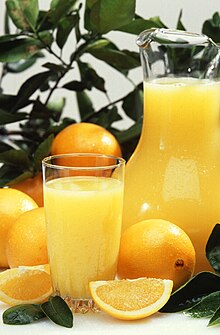This is an old revision of this page, as edited by AntiVandalBot (talk | contribs) at 02:50, 3 November 2006 (BOT - rv 71.34.177.155 (talk) to last version by Hu12). The present address (URL) is a permanent link to this revision, which may differ significantly from the current revision.
Revision as of 02:50, 3 November 2006 by AntiVandalBot (talk | contribs) (BOT - rv 71.34.177.155 (talk) to last version by Hu12)(diff) ← Previous revision | Latest revision (diff) | Newer revision → (diff) For other uses, see Orange juice (disambiguation).
Orange juice (sometimes abbreviated OJ in North America) is a fruit juice obtained by squeezing or pressing the interior of an orange. It is enjoyed as a beverage in many parts of the world and is often commonly associated with breakfast. Under U.S. law, products labeled "orange juice" must contain 100 percent real juice and pulp to be labeled as such. Orange drink may contain orange juice, but often contains added sugar. The largest exporter of orange juice is Brazil, followed by the United States (predominantly from Florida, where orange juice is the official state beverage).
Orange juice is commonly exported in dried form and infused in the destination country. Juice which is shipped in liquid form is traded as direct juice between producers. It is sold to consumers (in the U.S. and Canada) with the label "Not from concentrate."
One orange will typically produce about 90 grams of juice, and when freshly squeezed, orange juice has a fruity and, according to some, pleasantly acidic taste. Besides water and sugar, it is an excellent source of vitamin C (ascorbic acid) and potassium. Some producers include additional citric acid or ascorbic acid in the juice beyond what is naturally found in oranges. Some also include other nutrients such as Calcium and Vitamin D, not found naturally in oranges. Citrus juices also contain flavonoids that are believed to have beneficial health effects. However, if drunk on an empty stomach, orange juice can exacerbate present gastro-intestinal conditions, and/or cause mild and temporary stomach upset.
Frozen Concentrated Orange Juice (FCOJ) is a commodity product traded on the major commodity exchanges, including the New York Board of Trade and the Brazilian Mercantile and Futures Exchange.
When water is added to freshly-unfrozen concentrated orange juice, it is reconstituted. Almost all orange juice sold in the United States is reconstituted juice. There is a huge difference in the volume of frozen concentrated orange juice and unprocessed juice and this makes a difference in the price the consumer is charged.
There is some disagreement about the quality of fresh-squeezed juice versus juice that has been processed into frozen concentrated orange juice and reconstituted, as freshly squeezed orange juice often tastes better. However, while it might seem that concentrating and freezing would reduce the freshness of the juice, the time required for the juice to be bottled/packaged and delivered to the consumer might reduce the flavor just as much as the concentration/freezing process.
Orange juice and teeth
Orange juice contains citric acid and typically has a pH of 3.5. Drinking orange juice over a long period of time can therefore erode the tooth enamel. Drinking through a straw is often advised by dentists as the juice is then swallowed from the back of the mouth and does not come into contact with the teeth. It has also been suggested that brushing teeth right after drinking orange juice should be avoided as this can result in additional erosion to the teeth due to the presence of acid.
Orange juice in popular culture
- Singer Anita Bryant was a controversial spokeswoman for the Florida Citrus Commission; her anti-gay political campaigning led to a boycott of Florida orange juice.
- In the film Trading Places (starring Eddie Murphy and Dan Aykroyd), insider information about frozen concentrated orange juice plays a key role in the plot.
- Orange Juice (or oj) is often used to say 'only joking' (also oj) in internet chatrooms or during instant messaging sessions(i.e.msn)
References
- "Acids". British Soft Drinks Association. Retrieved 2006-09-12.
- M. A. Bassiouny, J. Yang, "Influence of drinking patterns of carbonated beverages on dental erosion", General Dentistry, May-June, vol. 53, no. 3, 2005.
External links
- How orange juice is made and its different types
- Bottled Sunshine... A Juicy Story Brief film clip of orange juice processing from 1968. From the State Library & Archives of Florida.